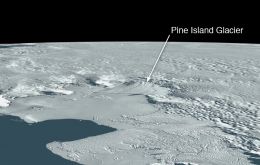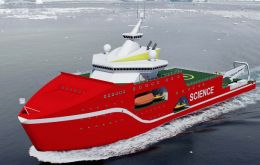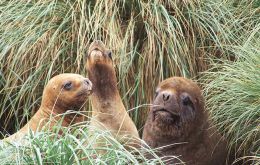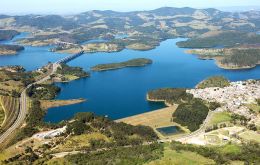MercoPress. South Atlantic News Agency
Environment
-
Friday, April 25th 2014 - 23:19 UTC
NASA and BAS tracking major Antarctic iceberg, B31, now in open waters

NASA has lately spotted a gigantic iceberg in Antarctica, identified as B31 and together with UK's BAS (British Antarctic Survey), is busy tracking the monster island of ice, which has now escaped into open waters. Despite its sheer size and mass, --experts estimate that the giant iceberg is approximately 600 square kilometres in size--, monitoring is not going to be an easy task with the coming of the Antarctic winter and ensuing darkness.
-
Friday, April 25th 2014 - 21:24 UTC
UK £200 million new polar research vessel will ensure presence in Antarctica and he South Atlantic

The British government will fund a new £200 million polar research ship to put UK scientists at the forefront of climate and ocean research in both Antarctica and the Arctic, Chancellor of the Exchequer George Osborne announced on Friday in a speech.
-
Wednesday, April 23rd 2014 - 11:40 UTC
Falklands sea lion population recovering, but still a fraction of the 1930s estimate

In the 1930s the Falkland Islands were reputed to hold the largest population of Southern sea lions, with a staggering 80,000 pups estimated to be born each year. However, a census in the 1960s and again in the 1990s revealed the population had declined by more than 90%.
-
Wednesday, April 23rd 2014 - 05:18 UTC
On Mother Earth Day, Ban Ki-moon calls for 'global transformation of attitude and practice'

On International Mother Earth Day, the United Nations is urging greater efforts to promote sustainable development and use of renewable energy sources, with Secretary-General Ban Ki-moon appealing for worldwide changes in attitude and practice to curb the negative impact of human activity on the planet.
-
Wednesday, April 23rd 2014 - 05:06 UTC
Cruise Lines association highlights efforts to promote environmental performance

In commemoration of Earth Day, Cruise Lines International Association (CLIA) highlighted on Tuesday the extensive efforts of the cruise industry and CLIA member lines to preserve and protect the environment.
-
Monday, April 21st 2014 - 07:47 UTC
Peruvian fish meal and fish oil companies losing money, claims the industry

Out of a total of 12 Peruvian companies in the fishmeal and fish oil industry, only two recorded profits during 2013, while the other ten accumulated a loss equivalent to 87.4 million dollars, according to the country's National Society of Fisheries, SNP.
-
Monday, April 21st 2014 - 07:13 UTC
Argentine experiment to catch livestock's flatulence and convert it into energy

Argentina's National Institute for Agricultural Technology (INTA) has invented a way to convert cow flatulence into usable energy, and it involves putting a plastic backpack on a cow. Livestock are responsible for a remarkable amount of global methane emissions, which are a major cause of global warming.
-
Friday, April 11th 2014 - 08:38 UTC
Water rationing round the corner for the metropolis of Sao Paulo, admits major utility

The metropolis of Sao Paulo may have to ration water this year if reservoir levels are not replenished, Brazil's largest water and sewage utility said, an increasing possibility as the southeast region heads into its dry season.
-
Wednesday, April 9th 2014 - 19:44 UTC
Renewable energy keeps advancing despite a drop in overall investment

Renewable energy's share of world electricity generation continued its steady climb last year despite a 14% drop in investments to 214.4 billion dollars, according to a new report released on Monday and produced by the Frankfurt School-UNEP Collaborating Centre for Climate & Sustainable Energy Finance, the United Nations Environment Program (UNEP) and Bloomberg New Energy Finance.
-
Wednesday, April 9th 2014 - 07:13 UTC
Lightning storms kill more than 60 cows in southern Chile

Ranchers in southern Chile say a series of lightning strikes has killed more than 60 of their dairy cows, costing the cattle owners thousands of dollars. Torrential storms and lightning on Sunday spawned the strikes in south-central Chile.
